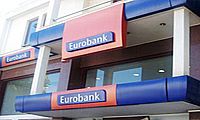Photo: naftemporiki.gr
The National Bank of Greece (NBG) is trying to raise 1.17 billion euro from private investors. The starting price of the shares on the Athens Stock Exchange is 4.45 euro and new investors are invited to take part in the process between the 7th and 13th of July. According to recent information, the NBG has raised 800 euro million in private capital from more than 350 businessmen and enterprises. Now, it is to send out 270,000 letters to small shareholders to invite them to participate in the recapitalization.
The Bank has four weeks to raise the required funds to keep its private character. Otherwise, the NBG, which, until recently, was the largest financial institution in the country, will be nationalized.
The Bank has four weeks to raise the required funds to keep its private character. Otherwise, the NBG, which, until recently, was the largest financial institution in the country, will be nationalized and the full value of its recapitalization will be borne by the Hellenic Financial Stability Fund, which is funded by the support programme of Europe and the International Monetary Fund to Greece.
Following the exchange of shares with Eurobank, the NBG has another 50,000 additional investors who will become shareholders of the bank for the first time as reported by Naftemporiki. Financial analysts state that the bank can cross the 10% threshold with the private funds it has raised so far but it is seeking additional capital in order to avoid issuing convertible bonds (Coco's). Greek media report that the recapitalization of the NBG involved the Latsis group and some hedge funds as well.
As of 10 April this year, foreign individual persons held 35.5% of the share capital of the NBG, private investors - 45.8%, insurance companies and public institutions held 13% and legal persons abroad held a 5.6% stake in the bank. So far, it is believed that the NBG is stabilizing and attracting new shareholders and that it has reduced its costs and improved the loans to deposits ratio.
Meanwhile, Piraeus Bank has announced that it will resort to a reverse split and that it will exchange  every 10 old shares with one new share at a price of 1.7 euro. The bank states that it has provided 570 million euro in private capital after signing a deal with two major international financial institutions. The goal now is to raise another € 163 million to avoid issuing convertible bonds.
every 10 old shares with one new share at a price of 1.7 euro. The bank states that it has provided 570 million euro in private capital after signing a deal with two major international financial institutions. The goal now is to raise another € 163 million to avoid issuing convertible bonds.
The management board of Piraeus has decided to increase the nominal value of its ordinary shares from 0.30 to 3 three euro and to reduce the shares in circulation at the ratio of 1 to 10 at the same time. After the conversion of the shares, the investors will be entitled to register 35.7 new shares for each old share.
 Eurobank is the only bank among the four largest financial institutions that did not try to raise 10% in private funds of the total amount required for recapitalization. As a result, the state represented by the Hellenic Fund for Financial Support has become a major shareholder in the bank. Despite the seemingly easy way in which Eurobank has solved its problems with the lack of capital, obviously things are not so simple. The financial institution has announced that the extraordinary general meeting will not be held on the date previously announced, namely 30 May 2013, and that it will take place on the date of the regular meeting, which is 27 June. The bank management refers to technical obstacles in connection with the general meeting. According to it, the new shares of the bank have not yet been launched on the Athens Stock Exchange although its recapitalization process has been completed.
Eurobank is the only bank among the four largest financial institutions that did not try to raise 10% in private funds of the total amount required for recapitalization. As a result, the state represented by the Hellenic Fund for Financial Support has become a major shareholder in the bank. Despite the seemingly easy way in which Eurobank has solved its problems with the lack of capital, obviously things are not so simple. The financial institution has announced that the extraordinary general meeting will not be held on the date previously announced, namely 30 May 2013, and that it will take place on the date of the regular meeting, which is 27 June. The bank management refers to technical obstacles in connection with the general meeting. According to it, the new shares of the bank have not yet been launched on the Athens Stock Exchange although its recapitalization process has been completed.
The recapitalization of the banks is only the first step in the process of their recovery as stated by George Provopoulos, president of the Bank of Greece. In the coming months, the banking system will be faced with new challenges. "After the banks provide a strong capital base, they will have to optimize the management of the new structures to achieve maximum synergies. They will submit regular reports on their activities to the Bank of Greece on a quarterly basis while, at the same time, preparing themselves for the upcoming stress tests at the end of the year," warns Provopoulos.